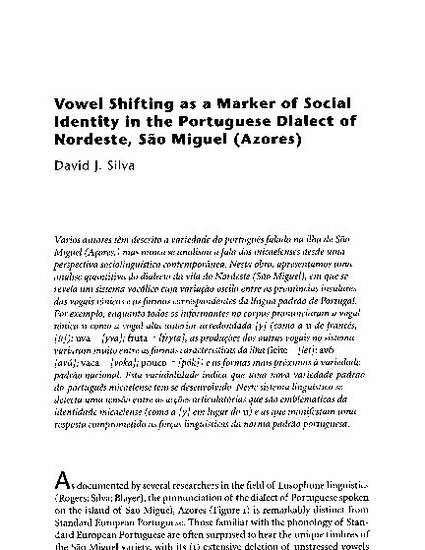
Article
Vowel Shifting as a Marker of Social Identity in the Portuguese Dialect of Nordeste, Sao Miguel (Azores)
Luso-Brazilian Review
(2005)
Abstract
English:
Several authors have described the variety of Portuguese spoken on the island of São Miguel (Azores,) but the speech of the Micaelans has never been analyzed from a contemporary sociolinguistic perspective. In this work, we present a quantitative analysis of the dialect of the village of Northeast (São Miguel), in which a vowel system is revealed whose variation oscillates between the island pronunciations of the tonic vowels and the corresponding forms of the Portuguese standard language. For example, while all the informants in the corpus pronounced the vowel tonic u as the previous high vowel rounded [y] (as u of French, [ü]): grape = [yva]; fruit = [fryta], the productions of the other vowels in the system varied widely between the island's characteristic forms (milk = [let], grandfather = [avú], cow = [vóka], little = [pök] close to the national standard variety. This variability indicates that a new standard variety of Portuguese from Micael has been developed. In this linguistic system a tension is detected between articulatory actions that are emblematic of the Micaelian identity (such as [y] instead of u) and those that manifest a compromised response to the linguistic forces of the Portuguese standard norm.
Português:
Vários autores têm descrito a variedade do português falado na ilha de São Miguel (Açores,) mas nunca se analisou a fala dos micaelenses desde uma perspectiva sociolinguística contemporânea. Nesta obra, apresentamos uma análise quantitiva do dialecto da vila do Nordeste (São Miguel), em que se revela um sistema vocálico cuja variação oscila entre as pronúncias insulares das vogais tónicas e as formas correspondentes da língua padrão de Portugal. Por exemplo, enquanto todos os informantes no corpus pronunciaram a vogal tónica u como a vogal alta anterior arredondada [y] (como a u de francês, [ü]): uva = [yva]; fruta = [fryta], as produções das outras vogais no sistema variaram muito entre as formas características da ilha (leite = [let]; avô = [avú]; vaca = [vóka]; pouco = [pök]) e as formas mais próximas à variedade padrão nacional. Esta variabilidade indica que uma nova variedade padrão do português micaelense tem se desenvolvido. Neste sistema linguístico se detecta uma tensão entre as acções articulatórias que são emblemáticas da identidade micaelense (como a [y] em lugar da u) e as que manifestam uma resposta comprometida às forças linguísticas da norma padrão portuguesa.
Disciplines
Publication Date
2005
DOI
10.1353/lbr.2005.0035
Citation Information
Silva, David. (2005). Vowel Shifting as a Marker of Social Identity in the Portuguese Dialect of Nordeste, Sao Miguel (Azores). Luso-Brazilian Review. 42. 1-22. 10.1353/lbr.2005.0035.
